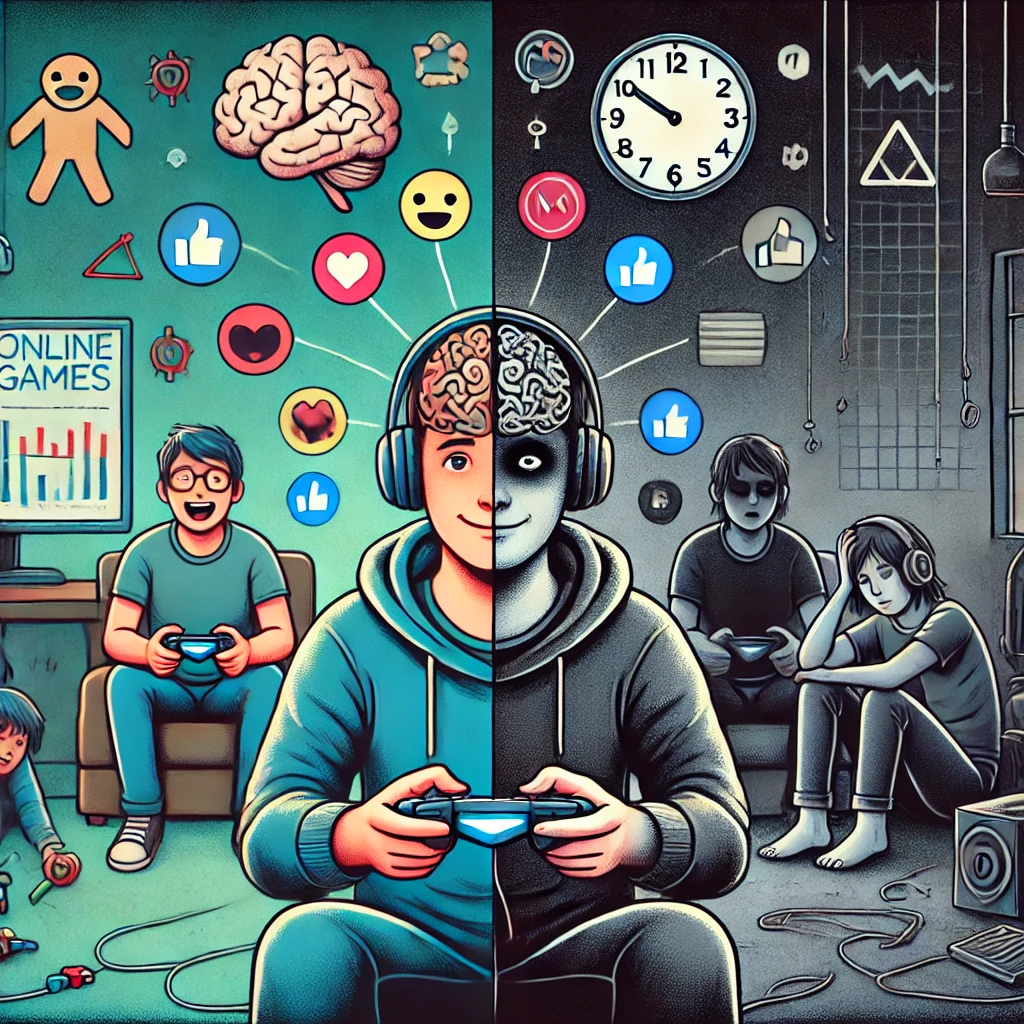The Impact of Online Games on Mental Health: Positive and Negative Effects

Online gaming has become a global phenomenon, with millions of people engaging in various games daily. From mobile games to complex multiplayer platforms, online gaming offers entertainment, connection, and sometimes even income opportunities. However, as its popularity grows, questions arise about its impact on mental health. Can online gaming benefit mental well-being, or does it pose risks? This article explores both the positive and negative effects of online games on mental health.
Positive Effects of Online Gaming on Mental Health
1. Stress Relief and Relaxation
Playing games can be a fun and effective way to unwind after a long day. Engaging in enjoyable gaming activities can release endorphins, helping reduce stress and promote relaxation. Games that offer immersive experiences, such as adventure or simulation games, allow players to escape daily pressures temporarily.
2. Cognitive and Problem-Solving Skills Development
Many online games, especially strategy and puzzle games, require critical thinking, quick decision-making, and problem-solving skills. These mental challenges can improve cognitive functions, including memory, attention, and processing speed. Games like Sudoku apps, chess platforms, or complex strategy games like “Civilization” stimulate the brain while providing entertainment.
3. Social Connection and Community Building
Online multiplayer games foster communication and teamwork. Gamers can connect with friends and meet new people globally, reducing feelings of loneliness and isolation. Platforms like “Fortnite,” “World of Warcraft,” and “Among Us” encourage players to collaborate, build friendships, and even participate in online communities that extend beyond the game itself.
4. Motivation and Goal Setting
Many games involve levels, challenges, and rewards that motivate players to set and achieve goals. This structure can translate into real-life motivation, encouraging players to develop persistence, patience, and a sense of accomplishment.
5. Therapeutic Applications
Certain games are designed with therapeutic goals in mind. For instance, apps like “SuperBetter” help users build resilience and cope with stress through game-like challenges. Additionally, virtual reality (VR) games are increasingly used in therapy to treat conditions such as anxiety, PTSD, and phobias.
Negative Effects of Online Gaming on Mental Health
While online games offer several benefits, excessive or uncontrolled gaming can lead to various mental health concerns.
1. Gaming Addiction and Compulsive Behavior
One of the most significant concerns is gaming addiction. The World Health Organization (WHO) officially recognizes “Gaming Disorder,” characterized by impaired control over gaming, prioritizing gaming over other activities, and continued gaming despite negative consequences. Symptoms include neglecting personal responsibilities, social withdrawal, and disrupted sleep patterns.
2. Increased Anxiety and Stress
While gaming can reduce stress for some, competitive games or online harassment during gameplay can lead to increased anxiety. Losing streaks, toxic in-game environments, or pressure to perform well can elevate stress levels, especially in competitive esports or ranking systems.
3. Social Isolation
Ironically, while some games promote social connections, excessive gaming can lead to physical social withdrawal. Spending long hours online may reduce face-to-face interactions, weakening personal relationships and leading to feelings of loneliness.
4. Impact on Sleep Patterns
Late-night gaming sessions, exposure to screen blue light, and the stimulating nature of games can disrupt sleep schedules. Poor sleep quality negatively affects mood, concentration, and overall mental health.
5. Exposure to Inappropriate Content and Cyberbullying
Many online games have open communication features, exposing players to inappropriate language, harassment, or cyberbullying. Younger players are particularly vulnerable to toxic interactions that can impact self-esteem and mental well-being.
Finding a Healthy Balance
Tips for Healthy Gaming Habits:
- Set Time Limits: Allocate specific hours for gaming to avoid excessive play.
- Prioritize Responsibilities: Ensure daily responsibilities, such as work, studies, and social commitments, are met before gaming.
- Take Regular Breaks: Stand up, stretch, and rest your eyes during long gaming sessions.
- Engage in Offline Activities: Balance gaming with outdoor activities, exercise, and face-to-face socializing.
- Monitor Emotional Responses: If gaming causes frustration, anger, or sadness, take a break and assess the emotional impact.
- Choose Positive Gaming Communities: Engage in games with supportive communities and avoid toxic environments.
- Use Parental Controls for Children: Parents should monitor game content and set limits to protect children from inappropriate content.
When to Seek Help:
If gaming interferes with daily life, relationships, or mental health, it may be time to seek professional help. Therapists specializing in behavioral addictions can provide strategies to manage gaming habits effectively.
Conclusion
Online gaming can be a source of joy, connection, and mental stimulation. When used in moderation, it offers several mental health benefits, including stress relief, cognitive enhancement, and social interaction. However, it’s essential to be mindful of the potential risks, such as addiction, social isolation, and disrupted sleep. By adopting healthy gaming habits and recognizing warning signs, players can enjoy online games while safeguarding their mental well-being.
Stay connected with our website for more insights, mental health resources, and practical tips to promote balanced and mindful gaming.